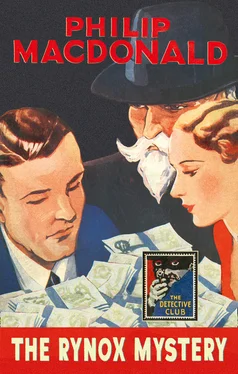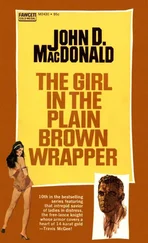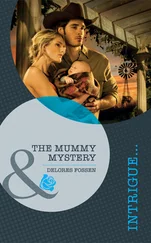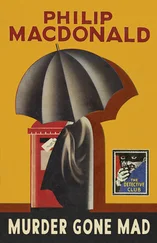Thus the indignant Entwhistle to his wife. Thus, later that same evening, the histrionic Entwhistle in the bar of The Coach and Horses. Thus the important Entwhistle in the Fordfield police station three days later.
2
James Wilberforce Burgess Junior was whipping his top upon the cement path outside Ockleton station booking office.
James Wilberforce Burgess Senior, Ockleton’s stationmaster, porter and level-crossing operator, watched for a moment with fatherly pride and then turned away to enter the hutch which was his booking office. He came out of the hutch a moment later a good deal faster than he had gone in. A sudden howl from James Wilberforce Junior had torn wailing way through the sunny morning.
James Wilberforce Junior was huddled against the wall with one hand at his ear and the other rubbing at his eyes. His top and his whip lay at his feet. Just within the doorless entrance was ‘that there Mr Marsh.’
The Ockleton Burgesses have not, for many generations, been renowned for physical courage. Some fathers—however big, however sinister-seeming, the assaulter of their innocent child—would have hit first and spoken afterwards. Burgess did not hit at all. He said, instead, a great deal. That there Mr Marsh stood in the shadow, the odd, pointed black hat tilted forward upon his head. The dark glasses made pits in his face instead of eyes; his white teeth gleamed when he smiled his savage, humourless and twisted smile. He seemed to Burgess, no less than previously to Entwhistle, ‘a feen in ’uman shape.’ He cut presently across the whiningly indignant outburst of outraged fatherhood. He said:
‘Cut it out! Cut it right out! I want a ticket for London.’ His deep, somehow foreign voice boomed round the tiny brick box.
‘Goin’ about,’ said James Wilberforce Burgess Senior, ‘strikin’ defenceless children! Don’t you know it’s dangerous to ’it a child on the yeerole?’
Mr Marsh took a step forward. Mr Burgess took three steps backwards. Mr Marsh pointed to the door of the ticket hutch. Mr Marsh said, and Mr Burgess swore afterwards that his teeth did not part when he said it:
‘Into the kennel you go, little puppy. And give me a ticket for London.’
Here Mr Marsh, Burgess reported, put his hand into his pocket and pulled out half a crown which, with a half-turn of his body, he threw to the still snivelling James Wilberforce Junior.
‘There,’ he said, ‘that’ll buy him a new ear! Blasted kid!’
‘All very well, sir,’ said Burgess, now speaking through the pigeon-hole, ‘walking about, striking defenceless children …’
Into the pigeon-hole Mr Marsh thrust his dark face.
‘Give me,’ said Mr Burgess afterwards, ‘a fair turn, sort of as if the devil was looking at you through a ’ole.’
Mr Marsh received his ticket. Mr Marsh was presently borne away by the 9.10 Slow Up from Ockleton. He had bought a day-return ticket.
Upon the Ockleton platform that night, there waited for Mr Marsh’s return not only James Wilberforce Burgess Senior but James Wilberforce Burgess Senior’s sister’s husband, one Arthur Widgery. This was a big and beery person whose only joy in life, after beer, was performing the series of actions which he invariably described as ‘drawin’ off of ’im and pastin’ ’im one alongside the jaw!’
But Mr Marsh did not take advantage of the return half of his ticket.
3
Mr Basil Musgrove, who had charge of the booking office of the Royal Theatre, was this morning presenting an even more than usually bored exterior to the world. Last night Mr Musgrove had been out with a set of persons to whom he referred as the boys. Consequently Mr Musgrove, underneath his patent leather hair, had a head which was red hot and bumping.
Mr Musgrove said into the telephone: ‘No, meddam. We do not book any seats at all under three shillings!’
Mr Musgrove said, to a purply-powdered face peering in through his pigeon-hole: ‘No, meddam, we have no stalls whatsoever for this evening’s performance. I am sorry.’
Mr Musgrove, when the face had vanished, put his head upon his hand and wished that the boys would not, quite so consistently, be boys. Mr Musgrove’s heavy lids dropped over his eyes. Mr Musgrove slept.
Mr Musgrove was awakened most rudely. Something cold and sharp and painful kept rapping against the end of his nose. Mr Musgrove put up feeble hands to brush this annoyance away, but, instead of being brushed away, its rappings grew more frequent and really so discomfortable that Mr Musgrove’s eyes were forced to open. With the opening of his eyes, the world came back with a rush. Mr Musgrove had been sleeping at his job! He saw now what it was that had awakened him. It was the ferrule of an ebony walking-stick. He looked down this stick. The ferrule was now hovering barely half an inch from the end of his nose. Peering round the stick, he saw a strange unusual sight; a pair of dark goggling, blank eyes set in a face which, he told some of those boys the next night, was just like Old Nick looking at you …
Mr Musgrove drew back with a start. His chair tilted underneath him and he narrowly escaped a fall.
The walking-stick was withdrawn. The window now was filled with this devil’s head under the strange, pointed black hat; there were dark glasses; a little grey block of beard; a white, twisted, inimical smile.
‘Er …’ said Mr Musgrove, ‘er … er … I beg … er …’
The stranger said a word. And then: ‘Any stalls tomorrow night?’
‘No. No,’ said Mr Musgrove, ‘no, no, no!’
‘I heard,’ said the stranger, ‘what you said the first time.’
Mr Musgrove strove to collect his scattered wits. ‘No, sir. No. We are entirely full for both the matinee and the evening performance today.’
The face seemed to come nearer. It was almost through the pigeon-hole. Mr Musgrove recoiled; once more felt his chair rock beneath him.
‘I didn’t,’ said the harsh voice, which seemed to find trouble with English r’s, though none with English idiom, ‘I didn’t ask for today’s performance. I asked about tomorrow !’
‘Oh! Er … I’m sorry!’ Mr Musgrove babbled. ‘I’m sorry. I’m afraid I didn’t catch what—’
‘Cut it out! Have you or have you not three stalls for tomorrow night’s performance?’
‘Tomorrow, sir, tomorrow?’ said Mr Musgrove. ‘Three stalls, sir, three stalls. Would you like them in the middle, sir, at the back, or in the front at the side … I have a nice trio in H—’
‘I don’t care,’ said the voice, ‘in the least where the hell the damn seats are! All I want is three stalls. Give ’em to me and tell me how much they are so that I can get away from your face. It’s not a pleasant face, I should say, at the best of times. This morning it’s an indecency.’
Mr Musgrove flushed to the top of his maculate forehead. The tips of his ears became a dark purple colour. As he said to the boys that evening: ‘D’you know, you chaps, if it had been any other sort of man, well, I’d have been out of that office and set about him in half a second. You know me! But as it was, well, believe me or believe me not, I just couldn’t move. I was rooted! All I could do was to give him his three seats and take his money. You see some odd customers in my job, but I’ve never seen such an odd one as that before and I don’t want to see another one like it. Horrible old bloke! Sort of nasty, sinister way to him, and what with that beard and those dark glasses and that limp—he sort of seemed to drag his left leg after him and yet go pretty fast—he was a horrible sort of chap! I’m going to look out for him tomorrow night and see what sort of company he’s got … Thanks, Ted; mine’s a port and lemon. Cheerioski!’
Читать дальше












